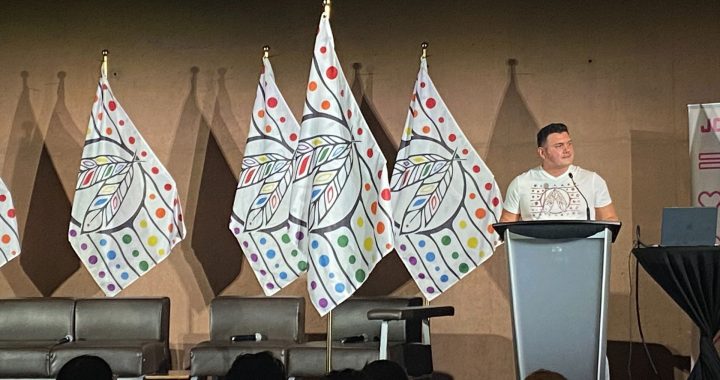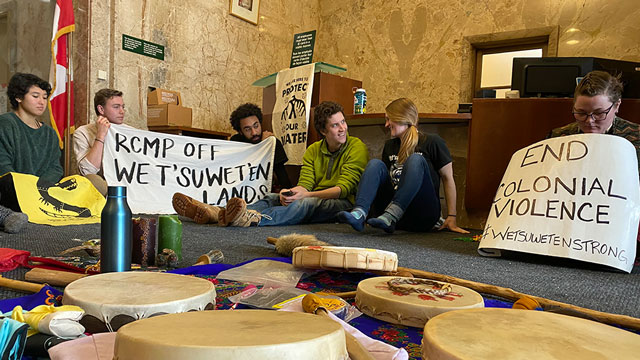
(Youth occupy the Justice Building in Ottawa: Photo: Jamie Pashagumskum/APTN)
People acting in solidarity with hereditary chiefs of the Wet’suwet’en Nation continue disrupting and blocking infrastructure across Canada amid ongoing sit ins and demonstrations.
This is the fifth day of protests and the fifth day of RCMP operations in British Columbia.
Federal police have been arresting people and dismantling obstructions so Coastal GasLink (CGL) can continue with construction of a $6.6-billion liquid natural gas pipeline through territory over which hereditary chiefs of the Wet’suwet’en Nation claim jurisdiction.
Twenty-one have been arrested as part of the injunction in northern B.C. Thirty-three have been arrested in Vancouver after an injunction was obtained to stop a port blockade.
No arrests have been made in Ontario, though an injunction has been obtained to end protests along rail lines which have stopped train service.
The completed pipeline project would carry fracked natural gas 670 km to Kitimat on the coast, where it would be exported to markets in Asia.
Hereditary chiefs representing the five Wet’suwet’en clans oppose the project, but all elected band councils along the route have signed agreements that express support.
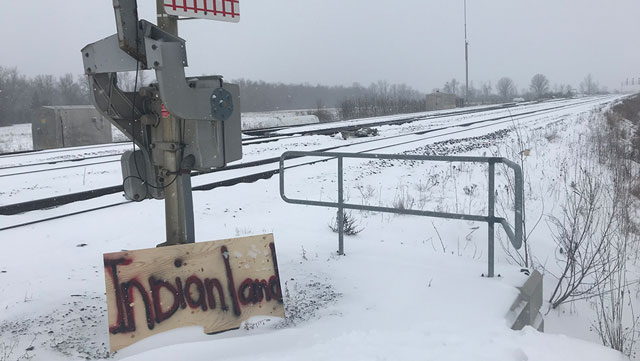
Halting trains
For the fifth day, a protest near the Tyendinaga Mohawk Territory halted train travel between Montreal and Ottawa to Toronto.
The people present said they have no plans to move until the RCMP leave Wet’suwet’en territory.
“The RCMP don’t want to pull out, so we’re not going to leave either,” said protestor Andrew Brant
“They’re not going to let up, they’re not going to stop. They’re still trying to move in on unceded territory – we don’t have any idea of a timeline of when they’re going to be out but we’re going to be here as long as they are.”
Meanwhile, separate action in Quebec also stopped trains.
People on Kahnawake Mohawk Territory have prevented trains from entering the city of Montreal.
Several tons of snow were dumped on the tracks, topped with a single lawn chair and an Iroquois confederacy flag.
The physical obstruction forced the cancellation of dozens of both commuter and freight trains this morning. According to Exo Candiac – which operates the commuter line – the shutdown is indefinite.
APTN observed about a dozen demonstrators at the site, where those present only provided their Kanien’keha (Mohawk) names.
“Your connection to this land is not the same as it is for us. It’s not about dollars and cents. It’s about our right to enjoy life. That’s what we’re talking about,” said Kahnawake resident Tekarontake.
“We don’t want alcoholism, we don’t want drug addiction, we don’t want suicides. We don’t want the poverty. We want to be a free people. That’s all we’re asking.”
“The main thing that we are asking for, from everybody – we want peace,” said another resident named Kahentinetha.
“And we want freedom. That’s what we ask, and that’s what we work towards. And we need the help of the people who are constantly attacking us. We need them to stop doing that.”
The public transit authority that operates the suburban train network in the Montreal metropolitan area said demonstrators near the Canadian Pacific Railway installations are hindering operations, and the ultimate decision to keep the rail line open lies with track owner CP Rail.
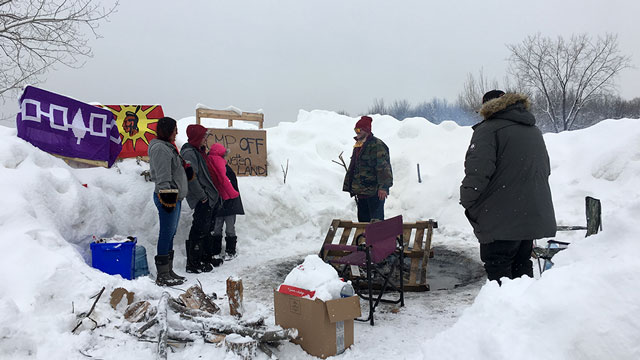
As of noon on Monday, Via Rail said 111 trains were cancelled and 19,500 passengers affected since the stoppages began.
“At this time, it is too early to tell how service resumption will take place as their [sic] will be significant rail traffic that will need to be dealt with,” the company stated in an email.
A travel advisory posted to the Via Rail website said refunds will be issued to those affected by the disruptions.
APTN asked the company how much the stoppages and refunds are costing, but did not hear back.
The company also confirmed another protest near New Hazelton, B.C. that is impacting travel between Prince Rupert and Prince George in both directions.
APTN also received a photograph that displayed a dozen demonstrators and four vehicles parked across train tracks on Listuguj Mi’gmaq First Nation.
CN Rail said nearly 200 trains had been impacted as of 5:00 p.m. ET on Monday.
“These blockades are having a severe impact on all Canadians as it is restricting the movement of all goods,” spokesperson Jonathan Abecassis wrote in a media release.
CN’s Ontario mainline has been shut down since Thursday.
The B.C. protests have shut down the company’s mainline there since Saturday, impacting movement in and out of the ports of Prince Rupert and Kitimat.
The company said it’s working with police to enforce injunction orders.

Sit ins and demonstrations
A crowd, hundreds strong – and growing every minute – assembled outside Prime Minister Justin Trudeau’s constituency office in Montreal on Monday to continue their push for rights recognition amid the ongoing struggle at Unist’ot’en camp.
The mid-afternoon demonstration was organized by McGill University’s Indigenous Student Alliance, who also held a peaceful sit-in at this office last Friday.
Prime Minister Justin Trudeau was across the Atlantic concluding a visit to Ethiopia.
In the nation’s capital, a group calling themselves the Indigenous Youth and Allies for Wet’suwet’en occupied the lobby of the Justice Building.
They asked to meet with someone from federal Justice Minister David Lametti’s office. They want Lametti to meet with hereditary Wet’suwet’en chiefs.
The building is across from the Supreme Court of Canada, just west of Parliament Hill.
“Indigenous youth and their allies are, they’re ready to mobilize because of what’s happening on the West Coast,” said Gabrielle Fayant, calling it “totally unfair and unjust.”
“Canadians for maybe the first time in history are ready to stand with Indigenous people to protect their homelands,” said Fayant, who is from Fishing Lake Métis Settlement in Alberta but lives in Ottawa.
On Sunday in Vancouver, demonstrators gathered outside City Hall.
The Union of British Columbia Indian Chiefs said it, Idle No More, and five other organizations staged the action in support of the Wet’suwet’en hereditary chiefs.
“The Horgan and Trudeau governments cannot continue pretending to ignore the sheer number of ongoing and escalating solidarity actions across Turtle Island that are progressively paralyzing the critical infrastructure of this country,” said Grand Chief Stewart Phillip in a press release.
“We are especially humbled and inspired that the majority of these critical actions are being fully led and carried out by Indigenous youth.”
In Winnipeg, a protest planned to shut down Portage Avenue, a major street in the downtown core.
Youth protesters continued occupying the office of Northern Affairs Minister Dan Vandal in that city demanding that authorities leave Wet’suwet’en territory.
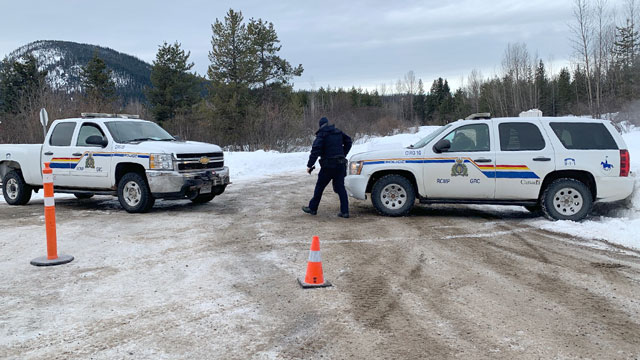
Arrests in Vancouver
According to Vancouver police, 33 people were arrested early Monday as officers in the city and in nearby Delta enforced an injunction preventing blockades at entrances to the Port of Vancouver and the DeltaPort container terminal.
Sgt. Aaron Roed said demonstrators were informed of the injunction Sunday night, shortly after it was obtained by the port authority, and those who refused to comply received several requests from police to clear blocked intersections before they were detained.
Police said traffic was disrupted during the morning rush hour along a major street parallel to terminals located in the downtown Vancouver port, but a webcam showed traffic was flowing to DeltaPort, the region’s largest container terminal, just after 8 a.m.
Port disruptions began Friday by demonstrators acting in solidarity with Wet’suwet’en hereditary chiefs opposed to construction of the Coastal GasLink natural gas pipeline across their traditional territories.
A spokeswoman for the protesters said the expedited, after-hours process used by the port authority to obtain the injunction on the weekend speaks to the impact of the demonstration.
“We are actively disrupting the money that’s coming in and out of the port to send a clear message that business as usual can’t keep going on if Indigenous people are under attack,” Natalie Knight said in a statement.
– With files from the Canadian Press.








